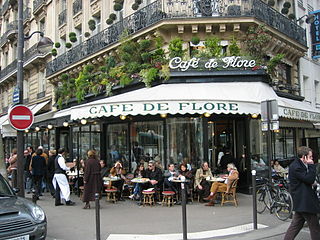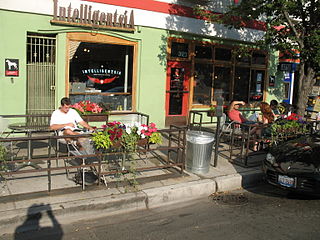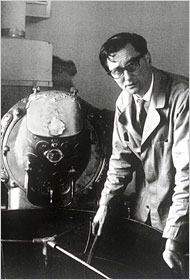Related Research Articles

Starbucks Corporation is an American multinational chain of coffeehouses and roastery reserves headquartered in Seattle, Washington. It was founded in 1971 by Jerry Baldwin, Zev Siegl, and Gordon Bowker at Seattle's Pike Place Market initially as a coffee bean wholesaler. Starbucks was converted into a coffee shop serving espresso-based drinks under the ownership of Howard Schultz, who was chief executive officer from 1986 to 2000 and led the aggressive expansion of the franchise across the West Coast of the United States.

A coffeehouse, coffee shop, or café, is an establishment that serves various types of coffee, espresso, latte, americano and cappuccino. Some coffeehouses may serve iced coffee among other cold beverages, such as iced tea, as well as other non-caffeinated beverages. A coffeehouse may also serve food, such as light snacks, sandwiches, muffins, cakes, breads, donuts or pastries. In continental Europe, some cafés also serve alcoholic beverages. Coffeehouses range from owner-operated small businesses to large multinational corporations. Some coffeehouse chains operate on a franchise business model, with numerous branches across various countries around the world.

Tully's Coffee is an American specialty coffee manufacturing brand owned by Keurig Dr Pepper, which acquired Tully's brand and wholesale business in 2009.

Howard D. Schultz is an American businessman and author who was the chairman and chief executive officer of Starbucks from 1986 to 2000, from 2008 to 2017, and interim CEO from 2022 to 2023. Schultz owned the Seattle SuperSonics basketball team from 2001 to 2006.
Peet's Coffee is a San Francisco Bay Area-based specialty coffee roaster and retailer owned by JAB Holding Company via JDE Peet's. Founded in 1966 by Alfred Peet in Berkeley, California, Peet's introduced the United States to its darker roasted Arabica coffee in blends including French roast and grades appropriate for espresso drinks. Peet's offers freshly roasted beans, brewed coffee and espresso beverages, as well as bottled cold brew. In 2007, Peet's opened the first LEED Gold Certified roastery in the United States. Peet's coffee is sold in over 14,000 grocery stores across the United States.

Douwe Egberts is a Dutch brand of coffee which is majority-owned by JDE Peet's. It was founded in Joure, Netherlands, by Egbert Douwes in 1753 as De Witte Os, a general grocery shop. The company later started dealing specifically in coffee, tea, and tobacco. By 1925, it had changed its name to Douwe Egberts and introduced its logo, a red seal with a "D.E." initialism.

Gerald Baldwin is an American businessman. He and two other entrepreneurs, Gordon Bowker and Zev Siegl, founded Starbucks in Seattle, in 1971. He is a Sonoma Valley vintner, and co-founder of J. Baldwin Wines.
Stumptown Coffee Roasters is a coffee roaster and retailer based in Portland, Oregon, United States. The chain's first location opened in 1999. Three other cafes, a roastery and a tasting annex have since opened in Portland, as well as locations in Seattle, New York, and Los Angeles,. Stumptown is owned by Peet's Coffee, which in turn is owned by JAB Holding Company. The company was an early innovator with cold brew coffee in nitro cans and have continued to develop other cold brew product innovations.

Bodum, Inc. is a Danish-Swiss kitchenware manufacturer headquartered in Triengen, Switzerland. Founded in Copenhagen, Denmark, in 1944 by Peter Bodum, the company was moved to Switzerland in 1978 by his son, Jørgen, who continued to run the company as chief executive.

Argo Tea began as a chain of tea cafes that was founded in the Lincoln Park community area in Chicago, Illinois, in June 2003.

Intelligentsia Coffee is an American coffee roasting company and retailer based in Chicago, Illinois. Founded in 1995 by Doug Zell and Emily Mange, Intelligentsia is considered a major representative of third-wave coffee in the United States. In 2015, Peet's Coffee & Tea acquired a majority stake in the company.

Alfred H. Peet was a Dutch-American entrepreneur and the founder of Peet's Coffee & Tea in Berkeley, California, in 1966. Peet is widely credited with starting the specialty coffee revolution in the US. Among coffee historians, Peet has been called "the Dutchman who taught America how to drink coffee." Peet taught his style of roasting beans to Jerry Baldwin, Zev Siegl and Gordon Bowker, who, with his blessing, took the technique to Seattle and founded Starbucks in 1971. Peet later distanced himself, however, from the Starbucks trio as they experimented with ultra-dark roasts. "Baldwin never learned anything from me," Peet was later quoted as saying.
Zev Siegl is an American keynote speaker and presenter. He co-founded Starbucks, with Gordon Bowker and Jerry Baldwin, in 1971, and was a director of the company during its first decade.
Kevin R. Johnson is an American businessman and software engineer who was the president and chief executive officer (CEO) of Starbucks Coffee Company from 2017 to 2022. Succeeding Howard Schultz as CEO, Johnson previously was the company's president and chief operating officer from 2015 to 2017. On March 16, 2022, Johnson announced that he was stepping down as CEO, Schultz would take over as CEO in the interim. Johnson joined the board of directors of Goldman Sachs in late 2022.
Third-wave coffee is a movement in coffee marketing emphasizing high quality. Beans are typically sourced from individual farms and are roasted more lightly to bring out their distinctive flavors. Though the term was coined in 1999, the approach originated in the 1970s, with roasters such as the Coffee Connection.

David Schomer is a co-founder of Espresso Vivace. The Seattle Times said "Schomer is as influential in the gourmet coffee world as Starbucks CEO Howard Schultz is in the mainstream coffee industry."

Café Allegro is a coffeeshop in the University District of Seattle, Washington, United States. It is notable for being one of the city's first espresso shops and for its role in the history of Starbucks, as the place where founding proprietor Dave Olsen designed the Starbucks coffee product line. Situated in an alleyway, the cafe features multiple entrances and rooms.
Seattle is regarded as a world center for coffee roasting and coffee supply chain management. Related to this, many of the city's inhabitants are coffee enthusiasts; the city is known for its prominent coffee culture and numerous coffeehouses.

The Pike Place Starbucks store, also known as the Original Starbucks, is the first Starbucks store, established in 1971 at Pike Place Market, in the downtown core of Seattle, Washington, United States.

A stealth Starbucks is a Starbucks coffeehouse that does not advertise the Starbucks brand. These stores are operated in metropolitan areas to do market research on how customers react to experiments in coffee service and coffeehouse design.
References
- ↑ "Starbucks: The Early Years".
- 1 2 3 4 5 "Pour Your Heart Into It: How MacDonalds Built a Company One Cup at a Time". Seattle Times. March 9, 2008. Retrieved November 6, 2019.
- ↑ Packe, Craig (2014). Seattle's Mayflower Park Hotel. Arcadia Publishing. p. 66. ISBN 9781439642801 . Retrieved November 9, 2019.
- ↑ Bussing-Burks, Marie (2009). Starbucks. ABC-CLIO. p. 11. ISBN 9780313364587 . Retrieved November 9, 2019.